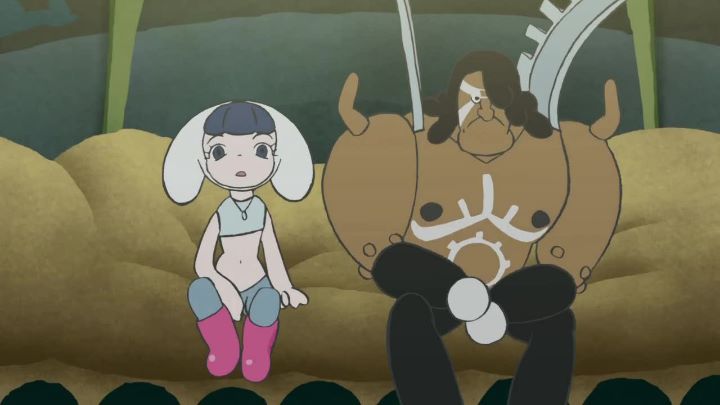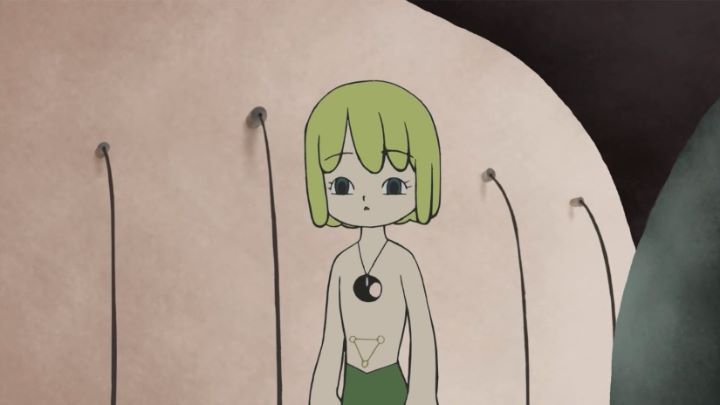






What if humans were able to make their memories portable? That is effectively the plot of "Kaiba," a 2008 television anime from auteur director Masaaki Yuasa. It's an incredibly amibitious and well-thought idea, but somehow it doesn't quite work, making it one of Yuasa's weaker shows, as special as it might be.To try to describe the story of "Kaiba" seems a futile effort, and even watching the show wouldn't help much unless you pay close attention. It starts with a scene where Kaiba, a young boy with green hair, runs away in a short chase scene before settling in a underground home, and shortly after stowing away on a ship out through space. Kaiba's situation is that he does not remember who he is, and unlike others around him, he seems to have a large hole through his chest where his heart would normally be. His only clue to his identity is a pendant necklace with a blurry photo, presumably of his lover, and his story is an adventure to find his memories or where he belongs. This character-driven plot takes a backseat to world building for the first half of the twelve-episode season. This is an alternate future where humans have their memories, and therefore their very souls and identities, bonded to transplantable cones. The ramifications of this are massive. Don't like your body? Take out your memories and plug it into a new one. Feeling sad? Your memories can be erased, or new happy memories can be transplanted. This could be the ultimate form of happiness, but the world isn't an ideal one. The use of memory transplants for pleasure are kept for the wealthy, while lower class citizens struggle to survive. If they need a new body to overcome sickness, they struggle to save enough money to buy one. Unsavory crooks and business dealers don't hesitate to steal bodies or memories, or buy them from desparate souls, for their own gain. These ideas can make for a lot of "what-if" stories, which is why the first several episodes are each stand-alone, with a different focus on a new side character while Kaiba traverses the world. I found the show very similar in tone to a lesser known 2004 anime anthology "Phoenix," and the 2003 anime "Kino's Journey." "Kaiba" has a more solid thoughline that requires the episodes be seen in order, but like those shows has a somber tone, filled with "what-if" short stories. Not many anime fit in that type of genre, which makes "Kaiba" worth the watch for the more academic viewer.The story doesn't stay with episodic content for long in order to reach a conclusion. By the second half, revelations come around to explain who Kaiba really is. A lot of it is a bit far-fetched, but the core of it is his love for the mysterious character in his locket. This makes the story more worthwhile, and makes it easy to classify this as a science-fiction-romance with philoshopical elements. Director Yuasa's style comes around in other ways in the story, and not always for the better. There is a fair amount of smart comedy, mostly physical, but it feels out of place to the rest of the show. And Yuasa's progressive attitude towards romance can distract some viewers: not surprisingly, the ability to switch bodies leads to a culture where one could copy their memories and effectively have sex with themselves, or switch genders and question their sexuality, but aren't afraid to flirt regardless. Kaiba himself ends up in a situation where he has to live in a girl's body for a few episodes, pushing off unwanted advances while questioning if his feelings are really his or belong to the original body. Which brings us to the show's visuals. Masaaki Yuasa is known for having an unconventional art style that can be an acquired taste, but generally his style stands out in a positive way. In "Kaiba," the visuals are odd and abstract enough that it can often make it difficult to understand what you are looking at in this future world, despite the competent animation. The characters look like exaggerated versions of what Osamu Tezuka might design, which means many of the characters have large heads and eyes that make them look like children, which can be disturbing when placed in situations of violence or sex. The English opening and ending themes are beautiful, but there is little to no music for the rest of the series, and the Japanese voice-acting (no English available) is unusually straight and boring. When paired with the initial story, the tone feels like floating alone in an ocean, eventually leading a viewer to sleep.It's a shame "Kaiba" didn't come togehter in a more impressive way to match the ambition and story it has to tell. An overhauled art style and soundtrack might have done a lot to make this special show. But even if it can be boring or confusing, I still have a special place for "Kaiba" in my heart, and would still recommend it to anyone looking for an unconventional anime.
Which brings us to the show's visuals. Masaaki Yuasa is known for having an unconventional art style that can be an acquired taste, but generally his style stands out in a positive way. In "Kaiba," the visuals are odd and abstract enough that it can often make it difficult to understand what you are looking at in this future world, despite the competent animation. The characters look like exaggerated versions of what Osamu Tezuka might design, which means many of the characters have large heads and eyes that make them look like children, which can be disturbing when placed in situations of violence or sex. The English opening and ending themes are beautiful, but there is little to no music for the rest of the series, and the Japanese voice-acting (no English available) is unusually straight and boring. When paired with the initial story, the tone feels like floating alone in an ocean, eventually leading a viewer to sleep.It's a shame "Kaiba" didn't come togehter in a more impressive way to match the ambition and story it has to tell. An overhauled art style and soundtrack might have done a lot to make this special show. But even if it can be boring or confusing, I still have a special place for "Kaiba" in my heart, and would still recommend it to anyone looking for an unconventional anime.